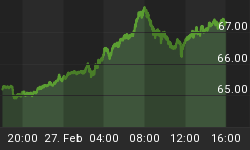As generally expected, German business sentiment slipped a little further in February, with the Ifo research institute's business climate index dipping to 107.0 from 107.9 in January. As Ifo's economists pointed out, some fall was expected after the three percentage point hike in the VAT rate that took effect in January (taking it to 19%), and a slide of less than a point is hardly dramatic. Overall, the level remains well above the long-term average.

In fact, almost all of the decline in the headline index came as a result of drops in the assessment of current conditions in the retailing and construction components (down by 4.3 and 4.7 points, respectively). Sentiment in both sectors had been biased upward in recent months in anticipation of that rate hike, and mild winter weather earlier in the season also played a role. Sentiment in the manufacturing and wholesaling components barely shifted (down 0.8 and 0.9 of a point, respectively). And while the business expectations index also declined from 103.2 in January, this month's reading of 102.6 remained well into positive territory.
Yesterday came confirmation that real GDP growth in Germany accelerated a seasonally-adjusted 0.9% on the quarter and 3.7% (working day adjusted) on the year, as surging exports offset a drop in domestic demand triggered by a massive liquidation of inventories. All told, the German economy still looks set to weather the VAT hike rather well. That bodes well for the wider Euro-zone, as does the news yesterday from the Belgian National Bank's (BNB) business confidence indicator. As we've noted before, thanks to Belgium's strong trade ties with its neighbors (about 80% of Belgium's manufacturing output is sold abroad, mostly to fellow EU members), the BNB's business confidence index is a reliable leading indicator - about six months out - for GDP growth in the Euro-zone as a whole.

After slipping a little over the previous four months, the overall index rose to 3.5 in February, thanks to a recovery in each of the three sub-components - manufacturing, trade, and construction. In manufacturing, both domestic and export orders picked up smartly in February.
One month does not a recovery trend make, but it does appear that Euro-zone GDP growth will hold up quite nicely this year. Euro-zone data to watch over the coming week include January money supply (Feb. 27), various sentiment surveys for February (Feb. 28), and flash February CPI (March 1), while the major German release next week will be February's unemployment data (Feb. 28).















